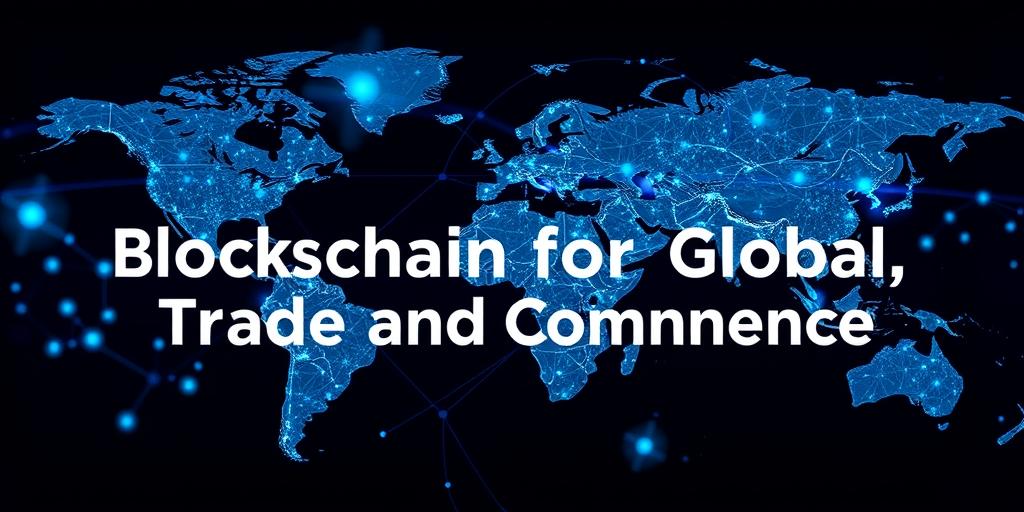Blockchain for Global Trade and Commerce
Blockchain technology is revolutionizing various sectors, and global trade and commerce are no exception. Its decentralized and transparent nature offers solutions to many challenges that plague traditional trade systems. This article explores how blockchain is transforming global trade, its benefits, and potential challenges.
Understanding Blockchain
At its core, blockchain is a distributed, immutable ledger that records transactions across many computers. Each transaction is grouped into a block, which is then cryptographically linked to the previous block, forming a chain. This structure ensures data integrity and transparency.
Current Challenges in Global Trade
Global trade involves numerous parties, including suppliers, manufacturers, distributors, financial institutions, and regulatory bodies. This complexity leads to several challenges:
- Lack of Transparency: Difficulty in tracking goods and verifying authenticity.
- Inefficiency: Cumbersome paperwork and manual processes.
- High Costs: Intermediaries and transaction fees add to expenses.
- Security Risks: Vulnerability to fraud and counterfeiting.
- Delays: Lengthy customs procedures and payment processing.
How Blockchain Addresses These Challenges
Blockchain technology offers innovative solutions to these problems by providing:
- Enhanced Transparency: All participants can view transaction details, enhancing trust and accountability.
- Improved Efficiency: Automation reduces paperwork and streamlines processes.
- Reduced Costs: Eliminating intermediaries lowers transaction fees.
- Increased Security: Immutable records prevent fraud and counterfeiting.
- Faster Transactions: Smart contracts automate payment processing and customs clearance.
Use Cases of Blockchain in Global Trade
Supply Chain Management:
- Tracking and Tracing: Blockchain enables real-time tracking of goods, ensuring authenticity and preventing counterfeiting. For example, Walmart uses blockchain to track the origin and movement of mangoes, reducing foodborne illness incidents.
- Inventory Management: Accurate and transparent records optimize inventory levels and reduce waste.
Trade Finance:
- Letter of Credit (LC) Automation: Blockchain streamlines the LC process, reducing paperwork and delays. Platforms like Contour and Marco Polo facilitate secure and efficient trade finance transactions.
- Supply Chain Finance: Improved transparency and trust enable better financing options for suppliers, especially SMEs.
Customs and Border Control:
- Automated Clearance: Blockchain can automate customs procedures, reducing delays and improving efficiency. Initiatives like the World Economic Forum’s Global Trade Digitization project explore blockchain’s potential in this area.
- Secure Data Sharing: Securely sharing data between customs authorities and traders enhances compliance and reduces fraud.
Intellectual Property Protection:
- Digital Rights Management: Blockchain can protect intellectual property rights by providing a secure and transparent record of ownership and licensing.
Benefits of Implementing Blockchain in Global Trade
- Increased Trust: Transparency and immutability build trust among participants.
- Reduced Costs: Automation and elimination of intermediaries lower transaction costs.
- Improved Efficiency: Streamlined processes and faster transactions save time and resources.
- Enhanced Security: Immutable records prevent fraud and counterfeiting.
- Greater Transparency: Real-time tracking and visibility improve accountability.
Challenges and Considerations
Despite its potential, implementing blockchain in global trade faces several challenges:
- Scalability: Handling large volumes of transactions efficiently.
- Interoperability: Ensuring different blockchain systems can communicate with each other.
- Regulatory Uncertainty: Lack of clear legal and regulatory frameworks.
- Adoption Barriers: Resistance to change and lack of awareness.
- Data Privacy: Ensuring compliance with data protection regulations.
Overcoming the Challenges
To overcome these challenges, collaboration between governments, industry stakeholders, and technology providers is essential. This includes developing common standards, establishing clear regulatory frameworks, and promoting blockchain education and awareness.
The Future of Blockchain in Global Trade
Blockchain has the potential to transform global trade by making it more transparent, efficient, and secure. As the technology matures and adoption increases, we can expect to see wider implementation across various trade processes. The future of global trade is likely to be one where blockchain plays a central role, facilitating seamless and trustworthy transactions between parties worldwide.
Conclusion
Blockchain technology offers a promising solution to the challenges in global trade and commerce. By enhancing transparency, improving efficiency, reducing costs, and increasing security, blockchain can transform how goods and services are exchanged across borders. While challenges remain, the benefits of blockchain are significant, and its continued development and adoption will undoubtedly shape the future of global trade.









